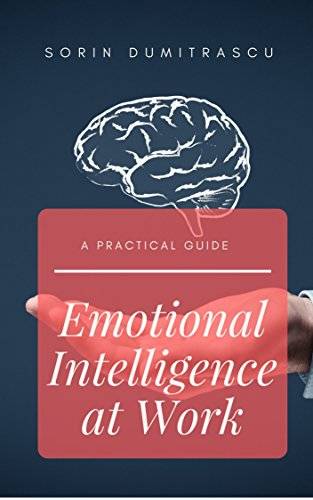

Emotional Intelligence at Work: A Practical Guide
by Sorin Dumitrascu
It was a terrifying scene: A lone gunman was holding several adults and children hostage on a New York subway. It seemed certain someone would be wounded or shot, when a male passenger, no bigger in size than the gunman himself, tackled the criminal and seized his weapon. This heroic act gives us insight into the purpose and intensity of human emotions.
This type of gesture suggests that deep feelings and emotions act as necessary guides when humans face situations too important to defer to the intellect alone. Situations that arouse such emotional responses include:
- facing danger,
- suffering a painful loss,
- pursuing goals despite frustration,
- bonding with fellow humans,
- building a family.
In all decision-making and action situations, feelings count as much, if not more, than rational thought. In fact, there has been far too much emphasis on rational thought (IQ) in the past when evaluating human behavior and potential.
In this book you'll gain an understanding of the emotional intelligence theory, and you'll explore the basis of emotional intelligence by examining the following four areas:
- the purpose of emotions,
- managing emotions,
- the impact of emotional intelligence,
- what it takes to become emotionally literate.
Can you measure your intelligence simply by taking an IQ test? Will your SAT scores determine your on-the-job success?
Studies show that emotional intelligence plays a role that's just as, if not more, important than IQ. By developing your people skills, you'll have a positive effect on your career. In this book, you'll explore:
- what emotional intelligence is,
- how to realistically evaluate yourself,
- why it's important to manage your emotions,
- how self-motivation affects your career.
Groups are common in the workplace. Why do some work groups flourish, while others seem to drag behind?
Team members develop a culture which contributes strongly to their success. Some groups have an atmosphere of excitement and an ability to adapt. Others resist change and have a negative, growth- inhibiting environment.
The ability to handle emotions appropriately and work well with others is known as emotional intelligence. This competency factors into the team's success.
Participation and collaboration are key to the success of your team. In this book, you'll explore the importance of these characteristics in accomplishing group goals. You'll also examine:
- the competencies needed to become an effective team member,
- the techniques for handling emotions,
- the ways to evaluate your team's emotional intelligence,
- the strategies for improving your team's emotional intelligence.
Stellar teams don't appear out of thin air. They're made up of the right people in the right place. These teams have the support and encouragement they need to succeed. Team members are committed to the success of the group and they work to enhance their abilities to thrive in today's fast-paced business environment. This book will help you contribute effectively to your team's growth.
This type of gesture suggests that deep feelings and emotions act as necessary guides when humans face situations too important to defer to the intellect alone. Situations that arouse such emotional responses include:
- facing danger,
- suffering a painful loss,
- pursuing goals despite frustration,
- bonding with fellow humans,
- building a family.
In all decision-making and action situations, feelings count as much, if not more, than rational thought. In fact, there has been far too much emphasis on rational thought (IQ) in the past when evaluating human behavior and potential.
In this book you'll gain an understanding of the emotional intelligence theory, and you'll explore the basis of emotional intelligence by examining the following four areas:
- the purpose of emotions,
- managing emotions,
- the impact of emotional intelligence,
- what it takes to become emotionally literate.
Can you measure your intelligence simply by taking an IQ test? Will your SAT scores determine your on-the-job success?
Studies show that emotional intelligence plays a role that's just as, if not more, important than IQ. By developing your people skills, you'll have a positive effect on your career. In this book, you'll explore:
- what emotional intelligence is,
- how to realistically evaluate yourself,
- why it's important to manage your emotions,
- how self-motivation affects your career.
Groups are common in the workplace. Why do some work groups flourish, while others seem to drag behind?
Team members develop a culture which contributes strongly to their success. Some groups have an atmosphere of excitement and an ability to adapt. Others resist change and have a negative, growth- inhibiting environment.
The ability to handle emotions appropriately and work well with others is known as emotional intelligence. This competency factors into the team's success.
Participation and collaboration are key to the success of your team. In this book, you'll explore the importance of these characteristics in accomplishing group goals. You'll also examine:
- the competencies needed to become an effective team member,
- the techniques for handling emotions,
- the ways to evaluate your team's emotional intelligence,
- the strategies for improving your team's emotional intelligence.
Stellar teams don't appear out of thin air. They're made up of the right people in the right place. These teams have the support and encouragement they need to succeed. Team members are committed to the success of the group and they work to enhance their abilities to thrive in today's fast-paced business environment. This book will help you contribute effectively to your team's growth.

